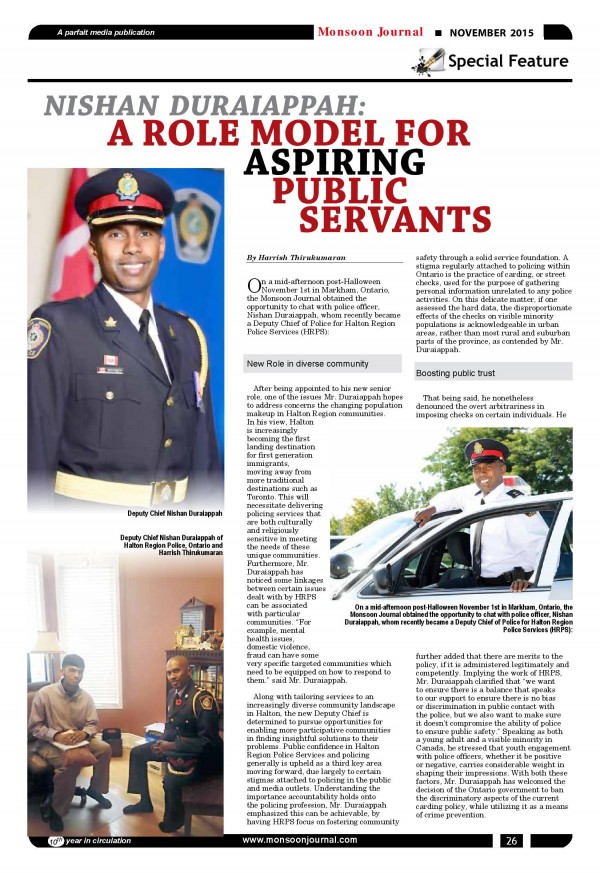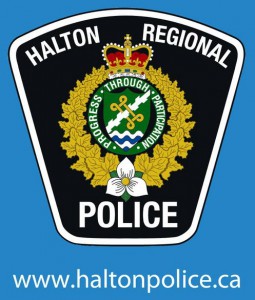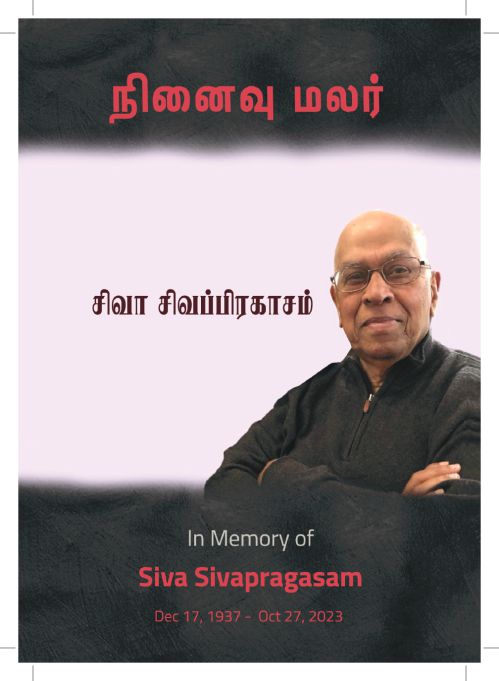By Harrish Thirukumaran
On a mid-afternoon post-Halloween November 1st in Markham, Ontario, the Monsoon Journal obtained the opportunity to chat with police officer, Nishan Duraiappah, whom recently became a Deputy Chief of Police for Halton Region Police Services (HRPS):
New Role in diverse community
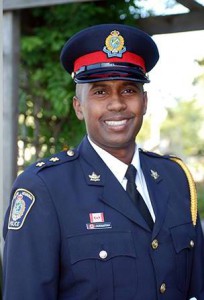
Deputy Chief Nishan Duraiappah
After being appointed to his new senior role, one of the issues Mr. Duraiappah hopes to address concerns the changing population makeup in Halton Region communities. In his view, Halton is increasingly becoming the first landing destination for first generation immigrants, moving away from more traditional destinations such as Toronto. This will necessitate delivering policing services that are both culturally and religiously sensitive in meeting the needs of these unique communities. Furthermore, Mr. Duraiappah has noticed some linkages between certain issues dealt with by HRPS can be associated with particular communities. ???For example, mental health issues, domestic violence, fraud can have some very specific targeted communities which need to be equipped on how to respond to them.??? said Mr. Duraiappah.
Along with tailoring services to an increasingly diverse community landscape in Halton, the new Deputy Chief is determined to pursue opportunities for enabling more participative communities in finding insightful solutions to their problems. Public confidence in Halton Region Police Services and policing generally is upheld as a third key area moving forward, due largely to certain stigmas attached to policing in the public and media outlets. Understanding the importance accountability holds onto the policing profession, Mr. Duraiappah emphasized this can be achievable, by having HRPS focus on fostering community safety through a solid service foundation. A stigma regularly attached to policing within Ontario is the practice of carding, or street checks, used for the purpose of gathering personal information unrelated to any police activities. On this delicate matter, if one assessed the hard data, the disproportionate effects of the checks on visible minority populations is acknowledgeable in urban areas, rather than most rural and suburban parts of the province, as contended by Mr. Duraiappah.
Boosting public trust
That being said, he nonetheless denounced the overt arbitrariness in imposing checks on certain individuals. He further added that there are merits to the policy, if it is administered legitimately and competently. Implying the work of HRPS, Mr. Duraiappah clarified that ???we want to ensure there is a balance that speaks to our support to ensure there is no bias or discrimination in public contact with the police, but we also want to make sure it doesn???t compromise the ability of police to ensure public safety.??? Speaking as both a young adult and a visible minority in Canada, he stressed that youth engagement with police officers, whether it be positive or negative, carries considerable weight in shaping their impressions. With both these factors, Mr. Duraiappah has welcomed the decision of the Ontario government to ban the discriminatory aspects of the current carding policy, while utilizing it as a means of crime prevention.
Although the true impact of this provincial policy change has yet to be realized for policing, Mr. Duraiappah firmly believes that individuals can be treated equally, when HRPS and other policing bodies exercise extraordinary powers for. The issue of, and subsequent response to carding sheds further light on the trait of adaptability that is crucial to policing performance in Ontario and Canada in its mandate to the public. In a sense, the new Deputy Chief interprets these changes as a reminder that a recurring task of his job and the broader policing community entails boosting public trust, something never to be shied away from in creating safer communities. Also, Mr. Duraiappah noted that Ontario and Canada should be proud of the work ethic of police officers and civilian employees within its extensive police community. He cited the general decrease in crime rates within the country as optimistically indicative of this quality.
Officers as normal people
Policing in Canada has had an advantage over the United States, in that the former has not experienced the complex issues dealt with by the latter on a regular basis. In short, Mr. Duraiappah sees improvements as a question of public confidence, and that must be routinely factored in to sustain a favourable police environment. Next, while the Policing and Ethnic Cultural Program (PEACE) of Halton Region Police Services certainly contributed to his career choice, it was the relationships that Mr. Duraiappah that had an everlasting impact. Accordingly, he was able to personally meet police officers, supervisors who proved to be the real sources of inspiration for his particular career endeavour. It wasn???t characterized as outright recruitment on their part, but more so an opportunity for the officers to demonstrate the human side of the profession to Mr. Duraiappah.
???The police are the public and the public are the police,??? quoted by Sir Robert Peel, the founder of modern policing in the United Kingdom—was a principle that resonated with Mr. Duraiappah. This reflected his perception that participants, like himself, in PEACE and other community-based programs allow them to see officers as normal people, coming home to their families or getting involved in their community. Mr. Duraiappah has maintained those initial connections to this day. Amusingly, prior to starting his policing career, he recalled how his own mother brought in a tray of scrumptious string hoppers and curried chicken during a Christmas shift at the police station. It was a kindly gesture to acknowledge the relationship he initially developed with the welcoming officers of the PEACE program, culminating in his decision to enter the police profession.
Make a difference
However, not all individuals, particularly youth, will enter policing because of relationships they build, but in the grand scheme of public confidence, they play a vital role. It helps to debunk negative media portrayals or other unfounded perceptions, by allowing them to experience an interaction, and judge on their own. One anecdotal example pertained to a Halton police officer returning a baseball to two initially fearful boys playing in a street, who actually ended up playing a casual game of catch. Their mother even sent a letter to HRPS expressing gratitude over the exchange. This, and other instances, represents how small doses of interaction can make a difference in public perception, according to Mr. Duraiappah.
Moreover, it brings into greater perspective the new approaches to community involvement undertaken by Halton Region Police Services. Essentially, the message has gone from ???this is how you can respond to problem A,??? to ???how can I spend some time with you to understand the situation, understand the dynamics within this community group, then we can seek solutions.??? This highlights the HRPS inclination for collaborative community strategies, with both adults and youth in specific situations. It especially reflects the new leadership focus of HRPS youth program where it???s about mobilizing young people with unique methods to problem solve or identify community issues. As mentioned, PEACE and other like-minded programs may not lead individuals to pursue policing, as was the case for Mr. Duraiappah, it will give those a chance to be policing ambassadors to their communities.
Demonstrate integrity and character
For those youth aspiring toward a career in law enforcement, Mr. Duraiappah stated that the composition of policing agencies should be reflective of growing Canadian diversity. It is recognized as an immensely rewarding career, containing diverse specialization opportunities. As a competitive field, interested youth should have a good education, an aptitude to learn, based on the changing nature of police services in areas like technology. Presenting strong dedication for community involvement that ties to their own character is integral as they apply. He emphasized the profession is open to all postsecondary educational backgrounds, including law, criminology, business, and kinesiology.
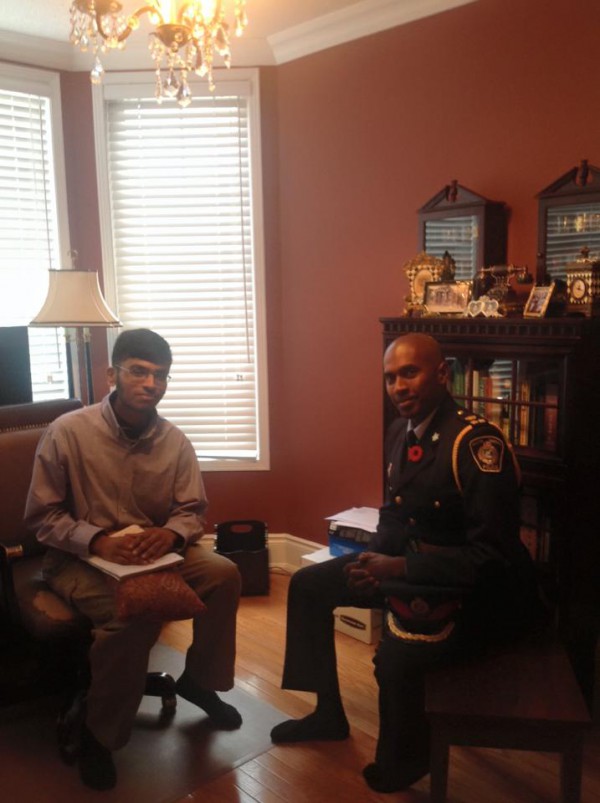
Deputy Chief Nishan Duraiappah of Halton Region Police, Ontario and Harrish Thirukumaran
Obviously, the profession warrants reasonable levels of fitness, but it also requires one to demonstrate their own integrity and character. In addition, it is ideal for individuals to be mindful that police organizations have varying cultures and identities, in which it is best to find ones that are compatible with their own values. Mr. Duraiappah was very humbled by his senior appointment, and of the fact he is the first Sri Lankan born Canadian of Tamil heritage to attain such a role. For him, he has overlooked this goal, as it has been normally about using his policing responsibilities to advance the betterment of communities in Halton, and not to necessarily increase his rank. He proudly considers it a genuine ???testament??? of the achievements the Canadian Tamil community has garnered with the opportunities they have been provided with.
From service to result
???I think we all, as a community, as a Sri Lankan community share the success because just as many first generation and second generation Sri Lankans have come to Canada and have been very successful, said Mr, Duraiappah. He hopes his career transition can help raise the profile of culturally specific issues in the community, and their participation. This includes areas like autism, as Mr. Duraiappah gets involved the South Asian Autism Awareness Centre in Scarborough, Ontario. With the new developments in his organization moving forward, for Nishan Duraiappah, public service is not just narrowly defined by the actions of public servants, but of the broader community whom contribute through volunteerism. ???It???s taking the focus away from the service to what the result is, is what we are intending.???
(Harrish Thirukumaran is pursuing a Bachelor’s degree in Political Science at Brock University in St. Catharines, Ontario.)
